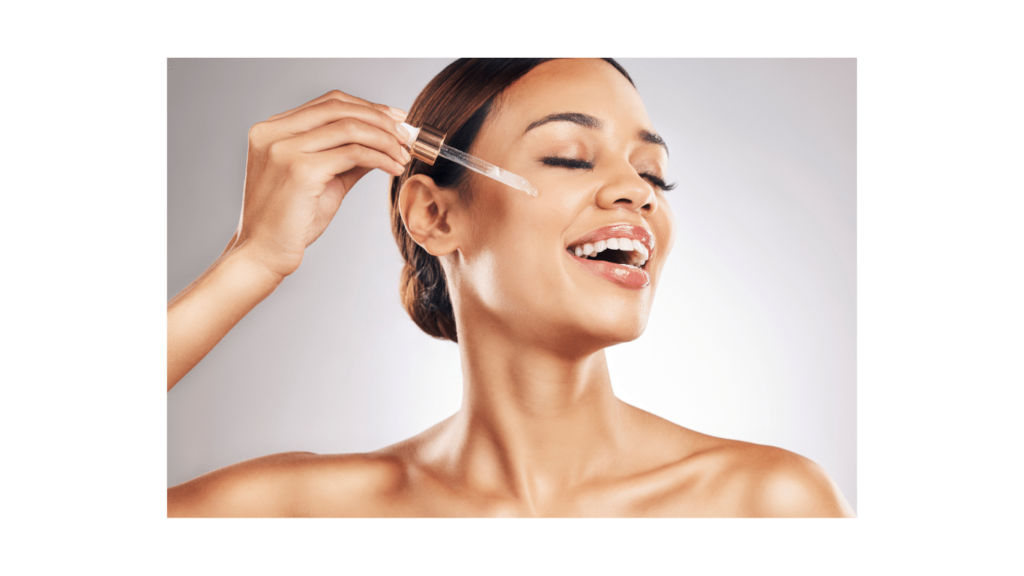Intro
In the vast world of skincare, few ingredients have been as extensively researched and praised as retinol. This powerhouse component has been touted for its remarkable ability to transform skin, addressing everything from fine lines and wrinkles to acne and uneven skin tone.
But what is retinol, exactly, and how can you harness its benefits to achieve glowing, youthful skin? Let's dive deep into the world of retinol and uncover the secrets behind this skincare wonder product.
Unveiling the Mystery - What Exactly is Retinol?
Retinol, a derivative of Vitamin A, stands out in the skincare landscape for its transformative effects on the skin. As a specific type of retinoid, it has garnered acclaim for its ability to deeply penetrate the skin layers, where it embarks on a mission to accelerate the renewal of skin cells and boost the production of collagen.
This attribute not only earmarks retinol as an exceptional agent for enhancing skin texture and firmness but also distinguishes it from its more potent relatives, like tretinoin, which require a prescription. Available in a plethora of over-the-counter formulations, retinol's versatility allows it to be a part of various skincare products, making it accessible for anyone aiming to revitalize their skin's appearance.
Its efficacy lies in its mechanism of action, which involves kick-starting the skin's natural regenerative processes, thus paving the way for a plethora of skin benefits, including but not limited to, the reduction of fine lines, evening out skin tone, and tackling acne. The science behind retinol's ability to rejuvenate the skin at a cellular level while being gentle enough for over-the-counter use is what cements its status as a cornerstone ingredient in the realm of skincare.
The Multifaceted Benefits of Retinol in Skincare
Retinol stands as a beacon of rejuvenation in the skincare realm, celebrated for its multifarious advantages. Its prowess in mitigating the visual impacts of aging is unparalleled; with consistent application, retinol has the power to significantly reduce the visibility of fine lines and wrinkles. This fosters a visage that appears both more youthful and vibrant, a coveted result for many skincare enthusiasts.
Beyond its anti-aging capabilities, retinol plays a critical role in the battle against acne. Its ability to unclog pores is essential in preventing breakouts, thus contributing to a clearer and healthier-looking complexion. What’s more, retinol’s influence extends to the correction of skin tone irregularities. It effectively fades dark spots and hyperpigmentation, promoting a uniform skin tone that enhances one’s overall appearance.
Exfoliation is another cornerstone of retinol's utility, where its gentle yet effective removal of dead skin cells unveils a layer of skin that’s not only brighter but smoother. This aspect of retinol’s action is particularly beneficial for those aiming to revitalize dull, lackluster skin.
While retinol's benefits are diverse, its true beauty lies in its ability to offer comprehensive skin enhancement. From refining skin texture and battling acne to addressing hyperpigmentation, retinol provides a holistic approach to skin health. This renders it an invaluable component in the skincare arsenals of those seeking to maintain or restore the skin's youthful vitality. As such, retinol continues to affirm its position as a formidable ally in the pursuit of radiant, healthy skin.
Decoding the Right Concentration for Your Skin Type
Navigating the world of retinol concentrations is akin to tailoring a bespoke suit; customization is key. The concentration that suits one's skin best is influenced by several factors, including skin type, tolerance, and specific skin concerns. Newcomers to retinol should approach this ingredient with caution, starting with a modest concentration of 0.25% to 0.5%. This lower strength is especially suitable for those with sensitive skin, allowing the skin to gradually acclimate to retinol's potent effects without undue irritation.
Individuals with more resilient skin types, such as oily or acne-prone, may consider commencing their retinol journey at a slightly higher concentration. However, the golden rule remains to proceed with care, closely monitoring the skin's response and adjusting as necessary.
As your skin becomes more accustomed to retinol, there exists the option to escalate the concentration, potentially up to 1% or higher for those seeking more pronounced results. This progression, however, should be undertaken gradually and always with the skin's well-being in mind.
It's crucial to remember that higher concentrations do not always equate to better results. Each skin's unique reaction to retinol dictates the optimal concentration more than any generalized advice. Hence, consulting with a dermatologist can provide personalized guidance, ensuring you select a retinol concentration that aligns with your skin's specific needs and tolerance levels. Through this careful and customized approach, the path to achieving the desired skin improvements becomes clearer, making retinol a truly adaptable ally in one's skincare regimen.
How to Incorporate Retinol into Your Skincare Routine
Embarking on a retinol regimen involves a methodical approach to ensure your skin reaps the maximum benefits while minimizing potential irritation. To seamlessly introduce retinol into your skincare routine, start with incorporating it gradually. Begin by applying a small, pea-sized amount to your face after cleansing and drying your skin, limiting use to 2-3 times per week in the evening. The reason for nighttime application lies in retinol's sensitivity to sunlight, which can diminish its effectiveness.
As your skin's tolerance to retinol builds, you may gradually increase usage to every other night, observing how your skin responds. If your skin adjusts well without adverse reactions, you can aim for nightly application. Following up with a moisturizer post-retinol application is crucial. This step is not just about adding hydration; it also helps in buffering any potential irritation that might occur, ensuring a more comfortable acclimatization period for your skin.
Sun protection is another critical component of a retinol-infused skincare routine. Given retinol's propensity to increase skin sensitivity to UV rays, applying a broad-spectrum sunscreen every morning becomes even more imperative. This practice not only protects your skin from sun damage but also preserves the integrity of the retinol's benefits, ensuring that your efforts to improve your skin's appearance are not counteracted by UV exposure.
By following these guidelines, incorporating retinol into your skincare routine can become a straightforward, stress-free process. With patience and careful attention to your skin's cues, you can unlock the transformative potential of retinol and enjoy the myriad benefits it has to offer.
Mitigating the Side Effects and Maximizing Benefits
Navigating the initial period of retinol use requires a strategic approach to minimize potential side effects while enhancing its skin-transforming benefits. A critical step in this process is the integration of retinol into your skincare routine at a measured pace. Beginning with a low concentration and limited application frequency allows your skin to adjust without overwhelming it. This cautious initiation can significantly reduce instances of redness, peeling, and dryness that new users often encounter.
Hydration plays a pivotal role in counteracting the drying effects of retinol. Incorporating a rich, nourishing moisturizer into your routine immediately after applying retinol can provide a protective barrier, helping to soothe and hydrate the skin. This step is essential for maintaining skin balance and comfort during the adjustment phase.
Additionally, it’s advisable to streamline your skincare regimen when starting with retinol. Temporarily setting aside products containing ingredients that could exacerbate irritation, such as exfoliants (like AHAs and BHAs) or high-concentration vitamin C, allows your skin to focus on adapting to retinol without unnecessary stress.
Another valuable tactic is to listen to your skin's feedback. If signs of irritation persist despite these measures, reducing the frequency of retinol application can offer your skin the respite it needs to recover. In some cases, alternating nights with retinol and a soothing, restorative product can strike the right balance between treatment and recovery.
By adhering to these guidelines, you can effectively manage the side effects associated with retinol use, ensuring a smoother transition to enjoying its full range of benefits. Remember, the goal is to nurture your skin, allowing it to gradually embrace the transformative impact of retinol.
Retinol Myths Debunked and Facts Clarified
The landscape of retinol usage is often clouded with myths that can deter potential users from experiencing its transformative benefits. A prevalent misunderstanding is the notion that retinol perpetually sensitizes the skin to sunlight. While retinol can make the skin more susceptible to UV rays during the initial stages of use, this can be effectively mitigated with diligent application of broad-spectrum sunscreen, enabling safe daytime activities without diminishing retinol's efficacy.

Another myth that warrants clarification is the belief that retinol is unsuitable for individuals with dry or sensitive skin types. This misconception stems from the potential side effects of dryness and irritation commonly associated with the initiation phase of retinol use. However, with a strategic approach that includes starting with a low concentration and gradually increasing frequency, along with the incorporation of hydrating products, retinol can be adapted to fit virtually any skincare routine, regardless of skin type.
The myth suggesting that immediate results should be visible also leads to premature discontinuation among users. It's crucial to understand that retinol works at a cellular level, requiring time to manifest visible changes. This process is not instantaneous but gradual, emphasizing the importance of consistent and patient use over time.
Debunking these myths is essential for setting realistic expectations and promoting a more informed and effective approach to incorporating retinol into skincare regimens. By dispelling these misconceptions, individuals are better equipped to harness the full potential of retinol, paving the way for enhanced skin health and appearance without undue concerns or misconceptions hindering their journey.
When to Expect Visible Results from Retinol Use
Embracing retinol in your skincare regimen demands patience and understanding of its gradual efficacy. Initially, within the first few weeks, you might notice subtle enhancements in your skin's texture and radiance. This early stage is characterized by a smoother feel and a more luminous appearance, signaling the commencement of retinol's transformative journey.
As time progresses, with consistent application, the deeper and more profound benefits of retinol begin to emerge. Around the three to six-month mark, you can expect to observe a noticeable diminishment in the appearance of fine lines, wrinkles, and perhaps even a significant fading of dark spots. This period is critical, as it showcases retinol's capability to impact the skin on a more substantial level, leading to visibly rejuvenated and healthier-looking skin.
It's important to continue regular use beyond these initial months to sustain and further the improvements achieved. Retinol’s full spectrum of benefits unfolds over time, with ongoing application ensuring that your skin remains in its optimal state, continually renewing and repairing. This enduring commitment to your retinol regimen is pivotal in maintaining the youthful, glowing complexion that retinol is renowned for delivering.
Thus, while the allure of quick fixes is tempting, retinol’s true value lies in its ability to effect lasting, significant changes, provided it is given the necessary time to do so. Adhering to a consistent routine, being mindful of your skin's adaptation, and adjusting usage as needed are key strategies in unlocking retinol's full potential for your skin.
The Bottom Line - Is Retinol Right for You?
Determining whether retinol is a fitting addition to your skincare strategy hinges on various factors, including your skin's current condition, goals, and any pre-existing sensitivities. While retinol boasts an impressive track record for enhancing skin health and appearance across a broad spectrum of concerns, it's imperative to consider personal circumstances that may warrant caution. Specifically, individuals navigating pregnancy or breastfeeding, as well as those dealing with sensitive conditions such as eczema or rosacea, are advised to seek alternatives or consult a dermatologist before embarking on a retinol regimen.
For the vast majority, however, retinol opens the door to significant skincare improvements, offering solutions to common issues like aging signs, acne, and uneven complexion with disciplined and informed use. The key to maximizing retinol's benefits while minimizing potential adverse effects lies in a thoughtful approach to its integration into your routine. This involves starting with lower concentrations, gradually increasing usage based on skin tolerance, and incorporating supportive skincare practices like diligent moisturization and sun protection.
In essence, retinol has the potential to be a transformative element in achieving healthier, more radiant skin for those who can safely use it. With proper guidance and a tailored application strategy, it stands as a potent ally in the quest for skin that not only looks but truly feels its best. As with any significant skincare decision, consulting with a skincare professional can provide personalized insights, making the journey with retinol both effective and rewarding.






